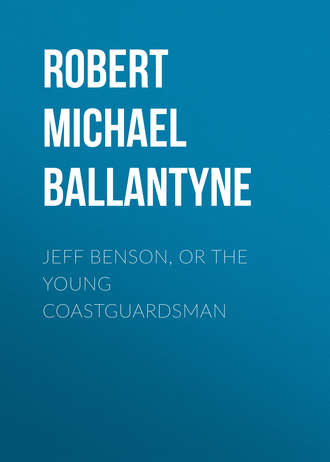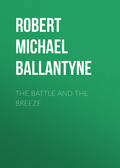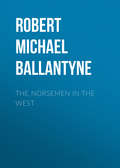
Robert Michael Ballantyne
Jeff Benson, or the Young Coastguardsman
Chapter Two
A Sea-Captain Relates his Adventures, and Refuses to Draw Morals
Captain Richard Millet, like his sister, was rather eccentric. Unlike her, however, he was large, broad, and powerful. It would have taken considerably more than “half a gale” to blow him away. Even a gale and a half might have failed to do that.
“Glad to meet you,” he said, extending his solid-looking hand with a frank, hearty air, on being introduced to Jeff. “My sister Molly has often spoken of you. Sorry to hear you’ve left the sea. Great mistake, young man—great mistake. There’s no school like the sea for teaching a man his dependence on his Maker.”
“The school is not very successful, if one may judge from the character of most of its pupils,” replied the youth.
“Perhaps you misjudge their character,” returned the captain, with a look of good-natured severity.
“I’m sure he does,” cried Miss Millet, with enthusiasm. “Noble-hearted, simple men, who would probably never go wrong at all if it were not for their unsuspecting trustfulness and bad companions! Come, sit down, Dick. Tea is ready.”
“Yes, young man,” continued Captain Millet “you misjudge ’em. You should not judge of a school by the shouting and mischief of the worst boys, who always flaunt their colours, while the good ones steer quietly on their course. You’ll understand that better when your beard is grey. Youth is fond o’ lookin’ at the surface, an’ so is apt to misjudge the character of men as well as the ways of Providence.”
Jeff took the rebuke in good part, readily admitted that youth was prone to err, and slily expressed a hope that in his case coming in contact with age might do him good.
“If you mean that for a shot at me,” cried the captain, with a loud guffaw, “you’ve missed the mark; for I’m only forty-five, an’ that isn’t age; is it, Molly?”
“Of course not. Why, you’re little more than a baby yet,” replied Miss Millet who greatly enjoyed even a small joke—indeed, she enjoyed almost everything, more or less, that was not wicked. “But now, Dick, I want you to tell Jeff some of your adventures in foreign parts—especially those that have a moral, you know.”
“Why, Molly, that’s a hard job—you don’t want me to draw the moral, do you? I never was good at that, though I’ve known fellows with that peculiar cast o’ brain as could draw a moral out of a marline-spike if they were hard put to it. Seems to me that it’s best to let morals draw themselves. For instance, that time when I was wrecked on the South American coast, I came to a shallow river, an’ had to wade across, but was too lazy to pull off my boots, ’cause they were long fisherman’s boots, right up to the hip an’ rather tight; so in I went boots an’ all. Just as I was gettin’ to the other side, a most awful alligator seized hold o’ my right foot. It’s wonderful how easy my boot came off just then! Although I was used to tug, an’ shove, and gasp, and pull, at that boot of a night, no sooner did the alligator lay hold on it than my leg came out like a cork out of a bottle, and I was out o’ the water and up the bank like a squirrel. Now, Molly, what would you say was the moral that should be drawn from that—Never use an alligator as a boot-jack—eh?”
“I should say, Never wade across a South American river without your boots on,” suggested Jeff.
“Well, now, I should say, Never wade across a South American river at all,” said Miss Millet; “but, brother, that’s not what I meant. Before you arrived, Jeff and I had been talking about God’s ways with man, and I was trying to show that disasters and what we call misfortunes are not necessarily evil, but are often the means of great blessing. I don’t think Jeff quite sees that. I can’t explain myself clearly, brother; but you know what I mean.”
While the old lady was speaking, the captain had become thoughtful.
“Yes, I know what you mean,” he replied, “and I agree with you heartily. Is it not written of our Saviour, ‘He hath done all things well?’ and is He not unchangeable? Of course it is not to be expected that we shall always see through and understand His ways though we can always trust Him; but sometimes He lifts a corner of the veil and lets us see. Very odd, Molly,” continued the captain, extracting a large black pocket-book with some difficulty from a breast-pocket, “very odd that you should have touched on this question, for I have somethin’ to say to you that bears on it. Look here. What’s that?”
He handed an oblong piece of paper to his sister, who examined it slowly.
“Why, Dick, it’s a cheque for 500 pounds.”
“Just so, old girl, an’ it’s yours.”
“Mine!”
“Ay, I might have given it to you when I first came back, but I took a fancy to keep it as a little surprise for our last evenin’ together, so that I might leave you with a good taste in your mouth. Now, listen, an’ I’ll spin you an’ Jeff a yarn. But first fill up my cup. I’m fond o’ tea—nat’rally, bein’ a teetotaler. Up to the brim, Molly; I like a good bucketful. Thankee—now, let me see.”
The captain put his hand to his rugged brow, became thoughtful for a few moments, and then resumed.
“Just before startin’ on my last voyage to China I ran down to Folkestone to see Rosebud—that’s my little daughter, Jeff. Surely you must have seen her when knocking about here?”
“You forget, Captain, I have not been in these parts for six years. Nevertheless, I did see Rosebud some ten or twelve years ago with her nurse in this very room.”
“Yes, so you did,” chimed in Miss Millet. “She was six at that time, and the dearest little angel I ever saw.”
“She was all that and a great deal more,” said the enthusiastic father. “It don’t become me to have much of an opinion about the angels, but I wouldn’t give my Rosebud for the whole lot o’ them, an’ all the cherubs throw’d into the bargain. Well, as I was sayin’, I ran down to Folkestone to the school where she is, and as we were partin’ she made me promise when I got to Hong-Kong to run up the river to see an old schoolmate o’ hers that had gone out there with her father. I was to give Clara Rosebud’s dear love, and her photograph, and get hers in exchange. I would have done this, of course, for my darlin’, anyhow, but I promised all the more readily because I had some business to do with old Nibsworth, the father.
“Well, after I’d got to Hong-Kong an’ seen the ship all snug, I thought of runnin’ up the river in a small steamer that was ready to start. It so happened that I got a letter that very day from Nibsworth himself, who had heard of my arrival, askin’ me to come without delay, as there was a grand chance of doin’ a bit of business that might turn in some thousands of pounds. But it would have to be settled next day, or the chance would be lost. You may be sure I didn’t waste time after readin’ this, but when I got to the river-side, I found that the steamer had started, and there wasn’t another till next mornin’.”
“What a pity!” exclaimed the sympathetic sister and Jeff in the same breath.
“Yes, wasn’t it? Of course it wasn’t a personal loss, but it was the loss of a splendid out-o’-the-way chance to do a good turn to the owners. It was an ill wind—Jeff, almost a disaster. Hows’ever, I had to grin an’ bear it. But I couldn’t rest till next day; so I hired a native boat, determined to do my best in the circumstances, and you may be sure I wasn’t in the best of humours, as we went creepin’ slowly up that river, when I knew that the hours of opportunity were slippin’ away.
“It was not till the evenin’ o’ the next day that I reached old Nibsworth’s house. Just before we rounded the bend of the river that brought it into view, I noticed smoke risin’ pretty thick above the trees. Of course I thought nothin’ of it till I found that it was the old man’s house was a-fire! Didn’t we bend to the oars then with a will!
“As we drew near, we found that all the servants and work-people about the place were runnin’ here and there, shoutin’ and yellin’ for ropes and ladders. Most people seem to lose their heads in a fire. Anyhow those people had; for nobody could find a ladder long enough to reach a top window, where I could see that someone was waving his arms for help. The moment we touched the beach, I jumped out o’ the boat and ran up to the house. It was blazin’ fiercely in the lower rooms, and I soon found that old Nibsworth and his daughter were inside—driven to the attics by the fire and smoke. They soon left the window where I had first seen the arms waving, and threw open another that was further from the fire.
“I saw that the old man was frail. The girl, they told me, was delicate. ‘Get straw, hay, branches—anything soft,’ I shouted, ‘an’ pile ’em under the window.’
“‘Him’s too weak for jump,’ gasped a native servant.
“‘Do as I bid ye,’ said I, with a glare that sent ’em all off double-quick. Happily I found a rope handy in a storehouse hard by. I made a coil of it. You know a seaman can usually heave a coil of rope pretty well. I made a splendid heave, an’ sent it right in at the window. The old man caught it.
“‘Make fast to a bed-post,’ I roared, ‘or a table, or chest o’ drawers—anything big.’
“He understood me, I could see, and presently he looked over the window an’ shook his head. Then I could see the face of a dark-haired, beautiful girl. Even through the increasing smoke I could tell that she was deadly pale, and drew back with a shudder. By this time a big pile of straw lay under the window. I saw there was no hope of such an old man lettin’ himself or his girl down by a rope, so up I went hand over hand. Many a time had I done the sort o’ thing for a lark when I was a youngster; but bein’ out o’ practice, and a good deal heavier than in old days, I found it hard work, I can tell you. Hows’ever, I managed it and got in at the window, an’ didn’t my heart give a jump when I saw that the old chap had only made the rope fast to a light bedroom chair. If I’d bin a stone heavier, I’d have pulled that chair right over the window!
“‘God bless you!’ cried the tremblin’ old man; ‘save my Clara!’
“There was no time for pretty speeches. I made fast the end of the rope to the leg of a table, made a loop on the other end, threw it over the girl, caught her round the waist an’ swung her over the window. I was in such a hurry that the rope nearly took the skin off my hands; but I landed her safe on the straw below. The old man was heavier, and not so easy to manage; but I got him lowered safe, and then, slipping over myself, began to descend. The flames had by that time got headway, and were dartin’ like fiery serpents’ tongues out o’ the windows below. One o’ them gave me a wipe in passin’, an’ cleared eyelashes, eyebrows, and half the hair o’ my head away. Another twined round the rope and singed it; so that when I was half-way down, it snapped, and I came to the ground with a thud that damaged my canvas ducks, though they were by no means delicate. Hows’ever, the pile of straw broke the fall, and I was none the worse.
“The gratitude o’ that poor old man and his daughter knew no bounds, specially when he found I was the father of his Clara’s favourite schoolmate.
“‘Now, Captain Millet,’ says he at partin’, ‘nothin’ in this world can repay what we owe you. I know it would be insultin’ to offer you money for such service, but sometimes men like you like to help a good cause. Will you accept of five hundred pounds for such a purpose?’
“‘No sir,’ says I, ‘I won’t! But I’ve a sister at home who spends all her time in tryin’ to do good. If you’ll be kind enough to send it to her, she’ll consider it a blessed windfall, and will lay it out to the best possible advantage.’
“‘Good,’ said he, seizin’ his pen an’ writin’ out the cheque. ‘Is your sister well off?’
“‘She might be better off,’ said I.
“‘Then pray beg her in my name to accept of a few shares in an Australian tin-mine which came to me a few days ago. They are not worth much, but I don’t want to be troubled with them; indeed, will consider it a favour if she will take them off my hands.’
“The old fellow said this with a laugh—so there you are, Molly, 500 pounds to the credit of your charity account an’ I don’t know how much tin transferred to your own.”
“O brother, how good—how kind!” Miss Millet paused here, and gazed in silence at the cheque, for she had already begun to calculate how far that sum would go towards the library, and the church, and the town-hall, and the model-houses, and the gymnasium, and the swimming-bath.
“And now, young man,” said the captain, turning to our coastguardsman, “the missin’ of that steamer, at which I growled so much that day, turned out to be a great blessin’ after all, although it seemed such a misfortune. For it caused me to arrive just in the nick of time to save two human lives—besides givin’ the old girl here somethin’ to think about and work upon for the next twelvemonth to come—whereas, if I had arrived the day before, I would have bin sleepin’ in the house, and mayhap have bin burnt alive wi’ old Nibsworth and his daughter. Seems to me as if that little story had some sort o’ bearin’ on the subject you was discussin’ wi’ Molly. But I’m not good at drawin’ morals, so I’ll leave you to draw it for yourself.”







